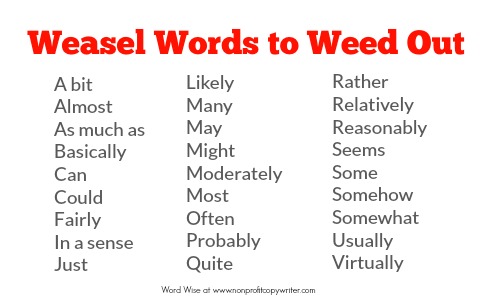Save Time: Get 5 Simple Writing Tips
you can put to use in 10 minutes
Writing Tip: Weed Out Weasel Words!
Award-winning writer Kathy Widenhouse has helped hundreds of nonprofits and writers produce successful content , with 750K+ views for her writing tutorials. She is the author of 9 books. See more of Kathy’s content here.
Updated 4.15.25.
You’ve probably done it. I mean … You HAVE done it.
You’ve used weasel words in your writing.
I have, too. (I did it just now, in the first sentence of this piece.)
Weasels are words that equivocate. They are vague qualifiers like generally, most, and probably that weaken your writing.
Writers use weasel words to avoid making direct statements. It is easy to miss weasels as you self-edit. You may think you can fudge your way through writing by using fuzzy language.
You can’t. So don’t.
Why Writers Use Weasel Words
Uncertainty
You use weasels when you’re confused about your point or you’re not sure what you want to write. Ambiguous terms allow you to equivocate. The end result is that you get something on paper but it is weak or cloudy.
Fear
You use weasels when afraid of making a bold statement. You may know what you want to write, but you lack the courage to do so … or you don’t have the depth to present a truth with grace. These words give you an out.
Deniability
You use weasels to protect yourself or to dodge taking a stand. If you don’t say anything, the thinking goes, you cannot be wrong. You can’t hurt people. You can’t make your readers angry. You can avoid criticism.
Uncertainty, fear, deniability … is that what you want to be known for as a writer?
Me, neither.
How to Fix Weasels
1. Find them. Make your search for weasels part of your self-editing process. Use the list below to get started. (Add to it in the Comments section when you think of other weasley qualifiers.)
2. Delete them.
3. Read the resulting statement to see if it works.
If the resulting statement without weasels is confusing …
Get clarity with your ideas. Determine what you want to say and then say it. (You can always edit it!)
If the resulting statement without weasels is too bold …
Write the strongest statement you can to take its place. Remain truthful!
If the resulting statement without weasels has no substance …
Ask yourself whether or not you have something to say. If not, then delete the sentence
A Word to the Wise
Weed out weasels to write clearly, truthfully, and substantively. Your readers will thank you by continuing to read what you write.
A Fun Fact
The term “weasel words” first appeared in a short story by author Stewart Chaplin titled, "Stained Glass Political Platform," published in The Century Magazine in June 1900. But it was popularized in a 1916 speech by former U.S. president Theodore Roosevelt.
More Editing Tips
Write Simply: Avoid 3 obstacles that keep you from being readable ...
11 Weak Words to Avoid in Writing ...
Want Clear Writing? Make It Short ...
Run-On Sentences Can Be Your Friend. Fragments, Too...
Slay Superlatives to Show, Rather Than Tell ...
Avoid Jargon in Your Content So Outsiders Feel Like Insiders ...
Write First, Edit Later: Stop Editing While Writing With These Tips ...
3 Great Reasons to Use an Online Word Count Tool ...
4 easy copywriting tricks anyone can master ...
Self-Editing: Swap Out These 7 Overused Writing Words ...
How to write cleaner for better results ...
Quick Tip to Get Started Writing Strong Each Day ...
5 copywriting fixes to make you sound professional ...
Readability check: an easy way to make your writing cleaner ...
Write better descriptions when you ditch these 2 words ...
Parallel Construction Explained: a simple mark of quality content writing ...
Exclamation Point?! When in Doubt, Leave It Out ...
Passive voice: it's an easy fix with this writing tip ...
Self-Editing Tip: Start a sentence with the subject, not extra words ...
More editing tips on our Pinterest board ...
Return from Weed Out Weasel Words to Nonprofit Copywriter home
As an Amazon Associate I earn from qualifying purchases.
Share This Page

Named to 2022 Writer's Digest list
BEST GENRE/NICHE WRITING WEBSITE


Stop Wasting Time!

Grab your exclusive FREE guide, "5 Simple Writing Tips You Can Put to Use in 10 Minutes or Less"











